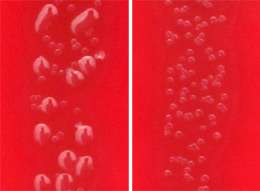Researchers demonstrate how 'interfering' RNA can block bacterial evolution

(Phys.org)—Bacteria may be simple creatures, but unlike "higher" organisms they have a neat evolutionary trick. When the going gets tough, they can simply pick up and incorporate a loose bit of genetic material from their environment. It's instant evolution, no time-consuming mutations required. This process, known as horizontal gene transfer, is an important reason why nasty bacteria like pneumococci are often able to evade immune system attacks and antibiotic drugs.
A Rockefeller microbiologist has now uncovered a mechanism by which bacteria can be forced to accept or reject the foreign DNA that they incorporate into their genomes through a process known as transformation. The researchers say that harnessing this mechanism could be a new way to restrict or manipulate bacterial evolution in ways that might be medically useful.
"Transformation is something that bacteria use as a last resort," says Luciano Marraffini, head of Rockefeller's Laboratory of Bacteriology. "In a desperate attempt to stay alive under hostile conditions, they start incorporating whatever genes they can find into their chromosome in the hopes that they can quickly evolve out of trouble."
"Our work shows that an RNA interference mechanism known as CRISPR can be used to block transformation in pneumococci."
Marraffini and his team, including Rockefeller postdoc David Bikard, conducted a series of experiments inspired by the original research on transformation performed by Rockefeller microbiologists Oswald Avery and Maclyn McCarty in the 1940s. They injected mice with pneumococci containing CRISPR sequences engineered to prevent the bacteria from acquiring the genes that produce a polysaccharide-based "capsule" on its surface that is necessary for the bacteria to establish infection. They also injected the mice with heat-killed pneumococcal bacteria containing genes that code for this encapsulation.
"Normally the mice will develop a systemic infection and die under these conditions, because the genes that encode for the capsules will successfully transfer to the live bacteria," says Marraffini. "But our experiments showed that when we used the engineered CRISPR-containing bacteria, the mice lived, proving that our CRISPR intervention successfully blocked the bacteria's ability to acquire the necessary sequences via transformation."
The researchers say their work shows that CRISPR has the potential to be an efficient means of targeting specific bacterial cells, such as those with antibiotic resistance or virulence genes, in order to kill them.
More information: Bikard, D. et al. CRISPR Interference Can Prevent Natural Transformation and Virulence Acquisition during In Vivo Bacterial Infection. Cell Host & Microbe, Volume 12, Issue 2, 177-186, 16 August 2012.
Journal information: Cell Host & Microbe
Provided by Rockefeller University

















